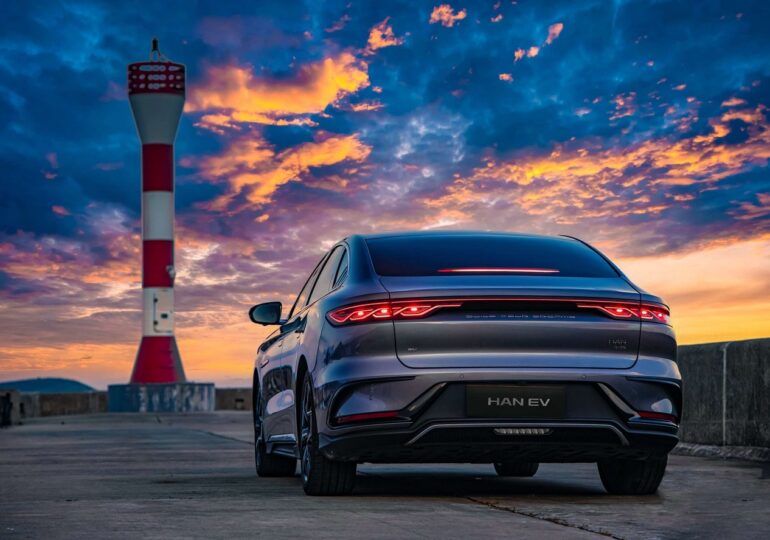Andy Palmer earned the nickname „EV godfather” after developing the Nissan Leaf, the world’s first mass-produced electric car. He says that Chinese electric vehicles offer a remarkable value-for-money ratio, but also have other attractive advantages, warning that manufacturers focusing on hybrid cars risk falling even further behind Chinese companies.
Palmer, former CEO of Aston Martin and an executive at Nissan, led the development of the Nissan Leaf project, the first mass-produced electric car, with over half a million units sold since its launch in 2010, as reported by Business Insider.
Instead of replicating the success of the Prius hybrid, Palmer drove Nissan to build a fully electric vehicle, eventually gaining support from the CEO at the time, Carlos Ghosn.
Although he would like to say that this car emerged from a desire to improve the world, the Nissan Leaf project was prompted by the emergence of the competing Toyota Prius model, he confessed.
A decade after that moment, the man dubbed the "EV godfather" is skeptical about manufacturers who have chosen the opposite direction and turned to hybrid cars.
"Hybrids are a road to hell. They are a transition strategy, and the longer you stay on that transition, the slower you arrive in the new world," Palmer said.
"If you just postpone the transition to electric vehicles by diluting it with hybrids, then you are more uncompetitive for a longer time and allow the Chinese to continue developing their market and dominance. Honestly, I think it's foolish," he added.
Chinese Make Some Damn Good Cars
In recent years, the auto industry has been shaken by the continuous expansion of Chinese auto brands like BYD, which have conquered the domestic market with a range of high-tech electric and hybrid vehicles at affordable prices and are now rapidly expanding abroad.
"Chinese cars are damn good. Chinese vehicles offer a remarkable quality-price ratio for what they deliver. Their battery technology is class-leading, and they have focused heavily on software," Palmer said.
In his view, the success of the EV sector in China is due to the country's long-term industrial strategy. A study found that the Chinese government has spent at least $230 billion on subsidies for electric vehicle manufacturers since 2009.
Palmer, who previously served on the board of Dongfeng Motor Company, a joint venture created by Nissan and Chinese state-owned automaker Dongfeng, said he witnessed firsthand how aggressive China's strategy is for electric vehicles.
"The order (from the Chinese government) was to move to new energy vehicles. It starts with an industrial strategy. That's the most important thing to learn. For most of the past 14 years, we in the West have not had an industrial strategy," he said about Western automakers.
The US and Europe have responded to the rise of Chinese automakers by imposing tariffs aimed at protecting their own auto industries, but Palmer says that tariffs would only affect the ability of Western companies to compete with their Chinese rivals. "My experience with tariffs is that they only make the domestic industry lazy. The gap becomes even wider," he explained.
Instead, Palmer argued that automakers should prepare to survive the battle with Chinese automakers, especially in Europe, where BYD and Xpeng have ambitious expansion plans.
"I think Chinese firms will learn from competition in Europe because it's the toughest market in the world. If they can do that, then they will be unbeatable," the expert said.
Palmer noted that Japanese manufacturers also face challenges. The former Nissan executive said his old company "shot itself in the foot" and squandered a promising range of electric vehicles and a 10-year lead in EV technology.
Indeed, Nissan announced in November that it will lay off 9,000 workers, while both Toyota and Honda are grappling with declining sales in China and decreasing profits. In December, reports emerged about discussions for a merger between Nissan and Honda.
The Only Chance for Others: Copy the Chinese
This year has been a challenging one for electric vehicles. Although sales continue to rise, the adoption rate of these cars has been slower than expected, leading automakers worldwide to reduce investments.
For Palmer, the reason some consumers have been hesitant to switch to electric is simple: these cars are too expensive.
"Prices need to align with internal combustion engines. And to do that, you need to be able to offer cars with smaller batteries," he said.
He believes that to sell cheaper vehicles with smaller batteries and lower range, governments would need to stimulate the deployment of charging networks to offset the reduced range.
He added that the West could learn from China's approach to industrial strategy—especially regarding batteries, a market that China dominates.
"If the West wants to catch up with China, I would support copying the Chinese," Palmer said.
"The alternative is that everything is Chinese at this point—even if you build your own battery cells, you still need to get all the minerals from China. The entire supply chain is locked," he emphasized.
T.D.

